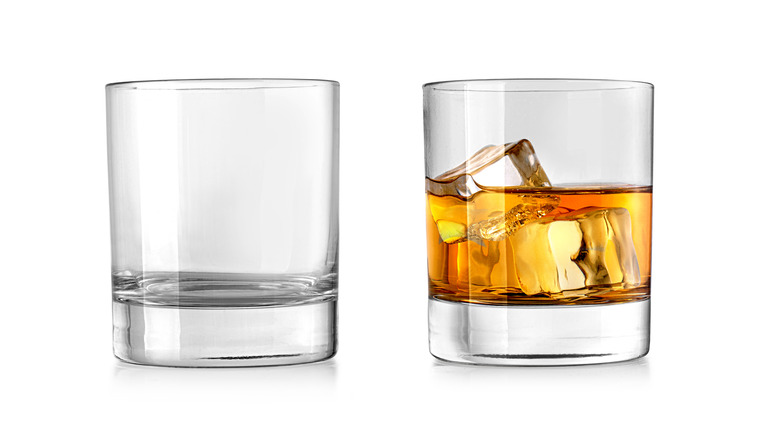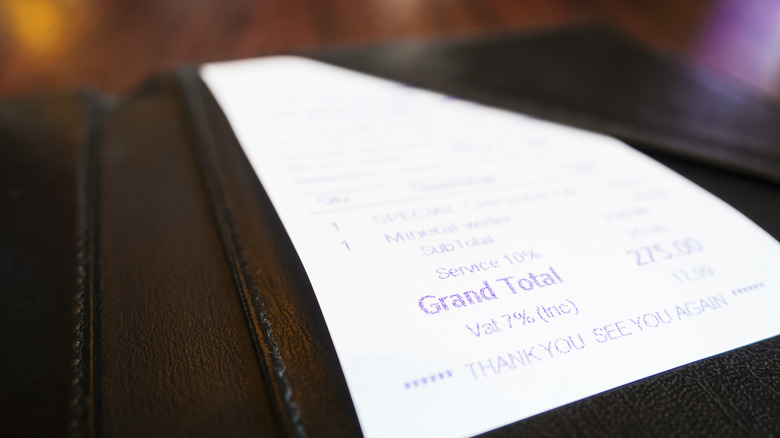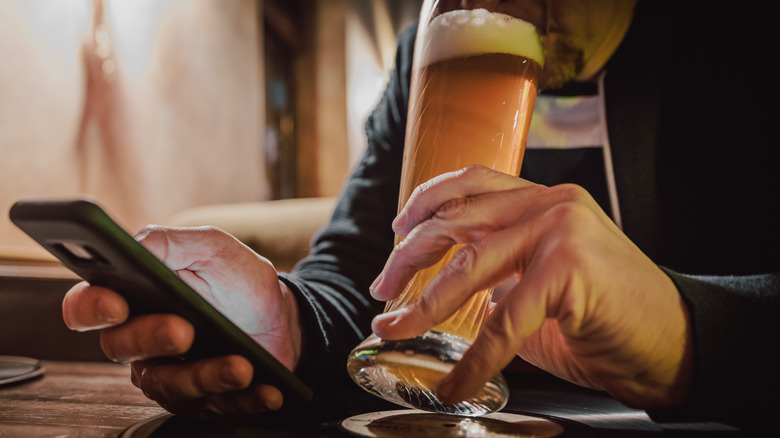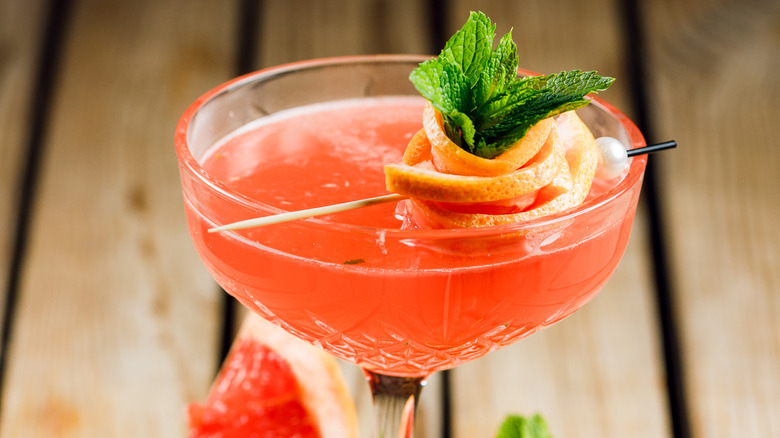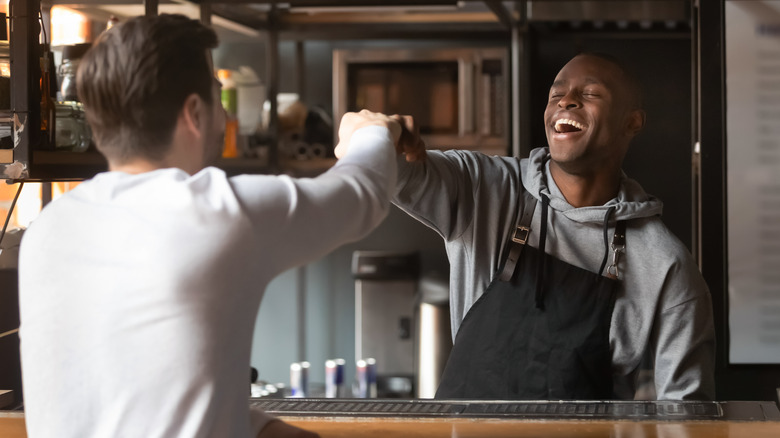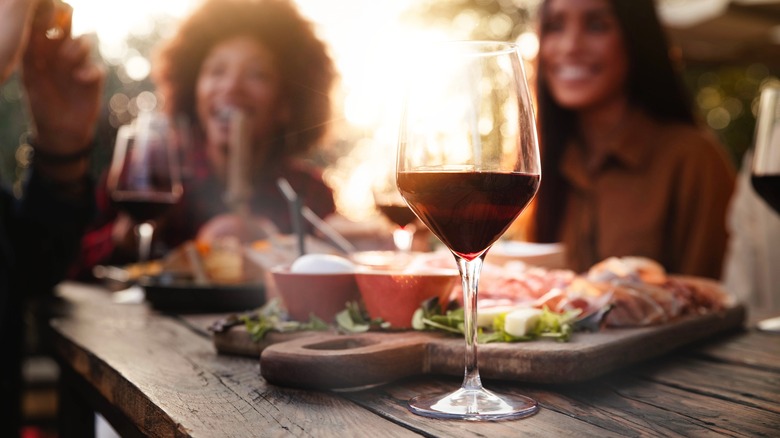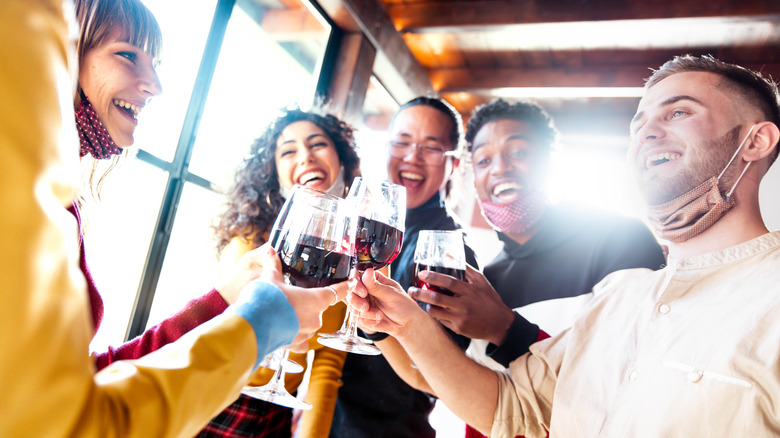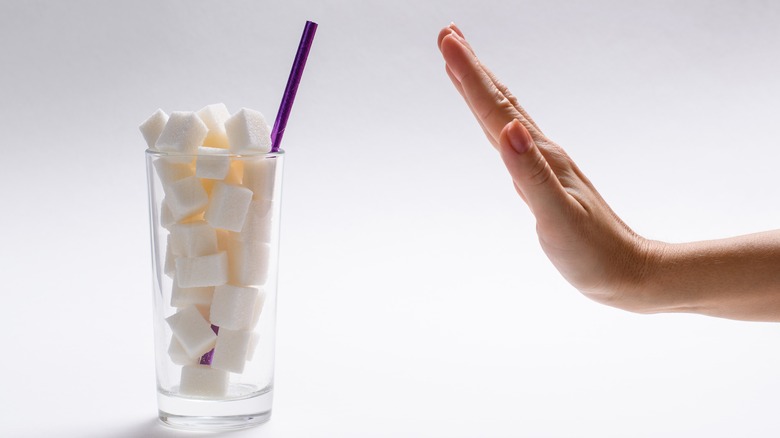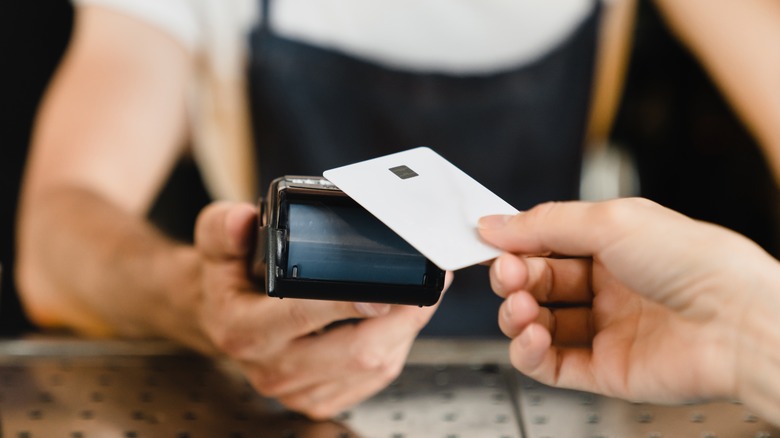I'm A Bartender. These Are My Favorite (And Least Favorite) Types Of Customers - Exclusive
As a bartender, I spend a good portion of my life interacting with a wide range of people — some of whom I love, and some of whom make me want to throw my cocktail shaker across the bar in rage. The good news is, the category in which you fall is completely determined by your behavior, and there are plenty of things you can do (and not do) to ensure you're in the former group and not the latter.
Of course, I'm behind the bar to make money and not to be your bestie, but building a good rapport with the person who's pouring the drinks never hurts. I'll be honest: If you're nice, polite, and tip well, chances are I'm going to prioritize your drinks over the person who's barking orders at me and causing a ruckus. If you want to go a step beyond basic human decency, read on to learn what separates my favorite customers from my least.
I love people who tell me to take my time — and mean it
It makes a big difference if you recognize that I'm slammed and want to mitigate some of my stress by telling me there's no rush. I'm always incredibly grateful for people who tell me to take my time, especially when they ask for something that's not pressing. For example, my bar has TVs, and although I'm happy to put on whatever sporting event you want, if I have a list of 10 drinks I need to make, changing the channel is going to be at the very bottom of my list of priorities (not to mention that doing so requires me to leave the bar to get to the cable box). Good customers recognize this and will ask me to put on the big game when I get the chance. Bad customers will ask me, ask me again, and then glare at me as I'm attempting to make five cocktails at a time.
On the other hand, if you tell me to take my time and still act impatient, your passive-aggressive nature isn't winning you any points in my eyes.
Customers who ask for an extra strong drink aren't my friends
I can't think of a single instance when someone has asked me for an extra strong drink and I've made it for them. I'll kindly offer you a double, and if you say no, you're getting a standard pour and my sincere irritation. I'm not behind the bar just pouring liquor to my heart's content. I'm either measuring it with a jigger or counting it with a speed pourer (a skill which I've put a lot of time and energy into making sure I can perform correctly).
Not only does asking for an extra strong drink let me know that you're not a very savvy bar patron, but it also lets me know that I need to keep an eye on your liquor consumption. A big part of my job is keeping people safe, so if you let me know you want to get on the fast track to intoxication, I'm going to be extra careful about monitoring how much you drink. Safety issues aside, I'm not too keen on finding out that you threw up all over our bathroom or watching you angrily throw your belongings across the bar (yes, I've seen both of these things and yes, they were caused by the type of person who asks for an "extra strong drink").
People who refuse to open a tab make my life harder
There are times when people genuinely think they're only going to have one drink and then end up hanging out and having a few more. These instances are absolutely no problem and are actually a good thing for me since it lets me know you're having a good time (and hopefully puts more money in my pocket).
That said, there are also people who intend on parking at the bar for the entire evening and yet insist on paying for their drinks one by one. Every minute I spend "just closing it out" is a waste from my perspective. I assure you that my internal annoyance will build with each and every round. Plus, the types of people who close out after each drink are usually bad tippers, and having to continue serving someone who I know is going to tip me 10% after every drink is soul-crushing. If you're going to tip badly, you should at least have the dignity to just do it once and then get out of my bar.
If you want to be a good bar guest, open a tab and then be responsible enough to remember to close it. End of story.
I'm grateful for customers who are grateful
This one might sound too simple to be worth mentioning, but you'd be shocked at how many people can't even be bothered to say thank you. While of course there are plenty of things people do that I find irksome, even the most outlandish, annoying customer becomes a lot more tolerable when they take the time to express even just a hint of gratitude.
If I'm slammed, someone saying that they see how hard I'm working — and that they appreciate it — is often enough of a morale boost to get me "out of the weeds." You don't need to go overboard (this is my job after all), but everyone enjoys being appreciated. I'm also of the mindset that you never really need to say "sorry" when you ask your bartender for something. You don't need to feel sorry that you want an extra slice of lemon or a new straw, you just need to say thank you when I give it to you.
Telling me how to bartend earns you a one-way ticket to my bad side
I've had people tell me how to pour a beer. I've had people ask me if I know how to make a martini. I've had people ask if I need help opening a bottle of wine. Almost nothing bothers me more than when people (who have usually never bartended a day in their life, or at least not professionally) try to tell me how to do my job. It's rude. It's annoying. And it's incredibly insulting.
It's a phenomenon that I don't really understand since I'm willing to bet that these people aren't going to their doctor's offices and telling medical professionals how to carry out procedures, or going to their CPA's offices and telling them how to do taxes. Even if they are, it's still frustrating. I know how to do my job, and I like to think that I'm good at it. If you think you can make a better cocktail than me, be my guest — just do it at home and not at my bar.
I genuinely enjoy customers who want to chat
Half of the reason I like bartending is that I like talking to people (if it's done appropriately and not when I'm fighting for my life on a busy shift, that is). I genuinely enjoy hearing about people's weekend plans, the big vacation they just went on, or their job.
I learn a lot from these interactions, too. Bartending allows me to interact with people whom I might not ever encounter otherwise. I meet people of all ages, who work in all industries, and who come from all different walks of life. They've made me sad, made me smile, made me become more open-minded, and made me see things in a different light. If I get the sense that someone wants to chat, but they're shy, I love being able to make them feel comfortable enough to come out of their shell. It's an even better feeling when someone comes in looking like they're feeling blue, and walks out with a smile on their face because they just needed someone to talk to. When you're a bartender, making drinks is important, but so is making connections.
I also enjoy guests who want to sit quietly
If you want to sit and read a book alone, I salute you. You're an easy guest and I'm often relieved if I have a lot going on. Customers who want to enjoy their drink in silence help balance out the talkers, and I can relate to wanting an hour of peace and quiet more than they'll ever know. Being able to recognize when someone doesn't want to talk is just as important (if not more) as being able to sense when someone is at the bar for the company more so than the drink. I always let the guest guide how they want their visit to go, and if they want me to say as few words to them as possible, I'll happily respect their wishes.
If the bar is mostly empty and someone wants to sit quietly, it means I'm able to tackle side work and prep without feeling guilty that I'm taking away from someone's experience. Quiet guests often allow me to clock out a little earlier at the end of the night, so I salute them for that, too.
Being adventurous makes my job more fun (usually)
If we've established a good rapport (and you aren't picky), I love it when guests are curious about cocktails I'm working on or who want to try something out of the box. I make a lot of the same drinks over and over again, so it's fun when someone wants to switch it up.
There's an art to creating your own cocktails, and you'll need to provide plenty of parameters if you want me to make you something unique. You'll also need to make it clear if there's anything you absolutely hate, because even the most adventurous of drinkers can be put off by the addition of their least favorite ingredient to their beverage. Just remember that being adventurous is in fact, a risk, so if you don't love your drink you should probably just suck it up.
If I'm testing out something new to put on the menu or to run as a special, I always have guests act as my guinea pigs. I'm always happy to ask regulars, but also I look for totally outside opinions from first-time guests who might be less concerned about hurting my feelings. All this is to say that if you're a cocktail nerd or you love learning about obscure liquors, let your bartender know — they might ask you to act as a taste tester!
Customers who have my back mean the world
Even a sympathetic glance in my direction when someone is being difficult can really boost my morale when things are going badly. I love the feeling of being able to breathe a collective sigh of relief with my guests when the annoyingly loud, obnoxious person finally walks out the door. It's comforting to know that I have people on my team. There are regulars who I know would go to bat for me if needed, and who genuinely make me feel safer in a position where things occasionally get dicey. It certainly doesn't happen every day, but people can be creepy and make me feel uncomfortable. Having a friendly face across the bar helps me deal with the person who keeps feeding me cringy pickup lines or who's snapping their fingers at me when they want to order a drink (if it isn't obvious, don't do this).
There are also plenty of subtle things people do that make me feel like they're my ally. Small things, like moving stools when a group comes in or pushing a glass to a spot where I can reach it, help more than most people will ever know.
I appreciate it when people remember details about me, too
I'm not expecting anyone to remember every little detail about my life, but I'm flattered when regulars think to ask me about my vacation or remember that I moved, that my family is in town, etc. If I can remember how you like your martinis, take time out of my day to answer your questions about the difference between Irish and Scotch whisky, or pretend that I didn't notice you bringing seven different first dates to the bar over the course of two weeks, the least you can do is remember my name if I've told you. I promise I have a lot more customers than you have bartenders, and if you want to be a good regular, you need to recognize that it's (somewhat of) a two-way street.
Again, it isn't anyone's job to know my life story, but if you've asked me where I'm from four visits in a row, it's disheartening. On the flip side of this coin, if you go to a bar once, please don't expect the bartender to remember things about you. As I said, the ratio of guests to bartenders isn't in our memory's favor.
Being too aggressive about happy hour is annoying
I get it — people want to save a few bucks when they go out for drinks. Even though I'm all for a good deal, ordering three glasses of wine for yourself five minutes before happy hour ends isn't cool (and I'll say no, anyways). The entire point of happy hour is to lure people into the bar so that they'll be more inclinded to stick around once it's over, and to build a customer base of people who want to come back. It isn't in the bar's best interest to offer happy hour prices, so please respect the concept and be grateful for your discounted glass of house red.
I also tend to get nervous when people ask certain questions about happy hour. If you're literally looking at the happy hour menu, and then ask if our top-shelf whiskey is included, I'm already mentally kissing my tip (and probably my sanity) goodbye.
Predictability is comforting
I'm great at remembering people's drink orders (names are another story), and there's something wildly comforting about being able to make someone "the usual." I love it when people stick to the script and drink the same thing each time they visit. Not only does being able to start making someone their drink the moment I see them walk in the door make me feel like I'm bartending in a movie, but most people who have a "usual" drink order tend to tip well and behave nicely. Guests also love it, and as much as I may gripe and complain about the general public, I really do want to make people happy.
The important thing to remember here is that if you have a go-to order, and one day you decide you're in the mood for something else, you need to let me know. I'm not a mind-reader, and if I've served you a traditional gimlet on the rocks every Thursday at 7 p.m. for six months, you're going to need to communicate with me if an espresso martini suddenly strikes your fancy.
There's nothing better than a bar full of bartenders
They're fun, kind, conscientious, and will usually do whatever they can to make your life easier. Even if they wanted a fancy, time-intensive cocktail, a bartender would almost never ask you to make one for them if they can see that you're too busy — they'll ask for a beer and a shot instead. There's a lot of camaraderie within the bartender community. We're all in on the job's biggest secrets, and we love supporting one another from the other side.
Bartenders usually check all the boxes as far as qualities that make someone a good bar guest go. Grateful? Check. Adventurous drinkers? Check. Can handle their liquor? Check. Good tippers? Double check.
Once in a blue moon, I'll serve a bartender who wants to show off their knowledge by asking me for something extremely rare and obscure (I'll pretend to go the back and Google it), or who "backseat bartends," but more often than not I'm thrilled to have fellow bartenders at the bar.
Customers who request a drink that's not too sweet drive me nuts
I don't think any of my drinks are "too sweet." In fact, I'm meticulous about making you a drink that's perfectly balanced. It's absolutely wild to me how many times someone will love a drink, but the second they realize it contains simple syrup, they won't order it again (or they'll order it sans syrup). I am here to tell you that cocktails contain sugar for a reason!
I'm annoyingly emphatic about this one, but if you want a drink to taste good, you need sweetness. So, if you ask for a mojito that's "not too sweet" you better not complain when it tastes bad —which it will, I promise. Sugar balances out acidity, bitterness, and the burn of booze. I'd go as far as saying that sugar is a cocktail's best friend.
I understand that plenty of people are diet/health conscious (and I'm not talking about people with genuine health issues here), but if you're drinking four rounds of margaritas (aka, a whole cup of tequila) the half ounce of simple syrup in each one should really be at the bottom of your list of worries. I'll end my rant here.
If you tip well, you're my hero
At the end of the day, I'm doing this for money. You could be the most unmemorable guest in the world, but if you tip well, you're my favorite. Since I make most of my money from tips, guests essentially act as my employers as far as my paycheck is concerned. It's probably safe to say that you wouldn't like your boss too much if they didn't pay you, so please don't forget the fiscal nature of the bartender-guest dynamic.
You don't even have to break the bank to let a bartender know you had a good time and enjoyed their service. If you tip an extra $5 on your tab (on top of the standard, of course) you better believe I notice — and that I'm grateful. Bartenders didn't set the standard for tipping. It's just the way society works, so please don't make us suffer just because you think we should do away with tipping. If you don't want to tip, stay home. If you do want to tip, enjoy your time at my bar. If you want to tip well, welcome to my list of favorite customers.


